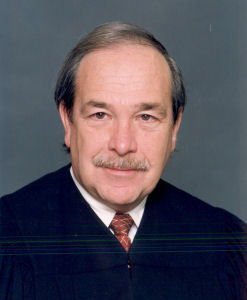The administrative judge of the Philadelphia court system's trial division signed off on new judicial regulations that will greatly affect the way mass tort cases are handled at the Common Pleas Court.
Philadelphia Common Pleas Court Administrative Judge John W. Herron issued an order this week that will eliminate the process of reverse bifurcation in asbestos cases and limit consolidation in other mass tort litigation at the civil trial division. The court had been reviewing comments and recommendations from attorneys and others in the legal community.
Judge Sandra Mazer Moss, supervising judge of the Complex Litigation Center, earlier had suspended reverse bifurcation in asbestos cases.
The order also contains a shakeup in judicial leadership. Effective May 1, Common Pleas Court Judge Arnold New, currently assigned to the Commerce Program, will be reassigned as a co-coordinating judge of the Complex Litigation Center, joining Judge Moss in administrating all programs at the CLC, the order states.
Moss will assume senior status on Dec. 31, at which time New will assume the role of sole coordinating judge of the CLC and its Mass Tort Program.
Following the proposed changes, plaintiffs attorneys, as well as defense counsel, were able to issue their own respective responses as to whether or not they supported the recommendations.
Herron's Wednesday order contains the following:
-No longer will there be reverse bifurcation of any mass tort case, including asbestos, unless agreed upon by all counsel involved;
-Consolidation of mass tort cases shall not occur absent an agreement of all parties;
-All punitive damages claims in mass tort cases shall be deferred;
-Pro hac vice counsel shall be limited to no more than two trials per year, but otherwise will not be limited on pretrial appearances, (the Court encourages non-Pennsylvania counsel to pass its bar exam and familiarize themselves with Pennsylvania law and rules of civil procedure);
-Unless otherwise agreed by defense counsel or upon showing of exigent circumstances, all discovery shall take place in Philadelphia; and
-Except for cases already scheduled for trial through the end of February, asbestos cases thereafter shall be in groups of a minimum of eight and a maximum of 10 and counsel shall be required to propose cases for consolidation using various criteria.
The criteria includes using the same law, meaning cases involving different states' laws will not be tried together; comprising the same disease; involving the same plaintiff's law firm; no consolidation of Fair Share Act and non-Fair Share Act cases; and other factors.
The judge's order stated that, among other things, the First Judicial District of Pennsylvania has invited out-of-state filings, has failed to meet the American Bar Association's suggested standards in more than half the filings and may not at the present time meet the needs of the citizens of Pennsylvania for the "prompt and fair resolution of these claims, while at the same time addressing the claims of non-Pennsylvania residents," and has failed to meet ABA suggested standards for the disposition of other mass tort cases, such as HRT, Paxil, Beryllium, Phen-Fen and Vioxx matters.
The court did, however, achieve 100 percent compliance with the Avandia, Trasylol, Digitek, Firefighters' Hearing Loss, Gadolinium and Anti-Convulsant Drugs programs, the order states.
Groups that support tort reform hailed the judicial order as a step in the right direction.
The American Tort Reform Foundation, which named Philadelphia's court system the No. 1 Judicial Hellhole in its annual report two years in a row, praised Herron's judicial order as a sweeping change that should "go a long way in mitigating the Complex Litigation Center's troublingly plaintiff-friendly reputation."
"(The American Tort Reform Association) is relieved to know that, despite the distracting denials and protests that came from some Philadelphia judges, plaintiffs' lawyers and self-described consumer advocates since the jurisdiction's fairness problems were documented by two consecutive Judicial Hellholes reports, serious-minded jurists there took the criticisms as they were constructively intended," a statement from the foundation reads.
"Their desire to render justice fairly for all parties with matters rightly before them in Philadelphia courts has helped to drive the new rules detailed in Judge Herron's order. ATRA applauds the courage of these Philadelphia judges in challenging the status quo, and it encourages all Keystone State policymakers to broaden their reform efforts."
According to Herron's judicial order, the asbestos case inventory as of Feb. 3 numbers 770.
"Since 2006 when the asbestos inventory numbered 589 cases, there has been a pronounced upward trend in filings in each successive year," the order states. "Although the disposition rate remained at an average of 244 cases per year over this six-year period, the Court's disposition rate has not kept pace with filings and a significant backlog has developed and will continue to develop if measures are not implemented to ameliorate the trend."
The order also states that from 2001 to 2008, an average of one-third of the mass tort filings came from outside of Pennsylvania, and a "dramatic increase" in the filings took place after the court's leadership invited claims from other jurisdictions.
"In 2009, when published comments were offered encouraging the filing of claims in Philadelphia, out-of-state filings soared to 41 percent and in 2011 reached an astonishing 47percent," the order states.
Another additional change in the order requires mass tort grouping to not receive a trial date until they reach a group of between eight and 10 cases.
Big changes come to Phila. Mass Tort Program; coordinating judge to be replaced at year's end

ORGANIZATIONS IN THIS STORY